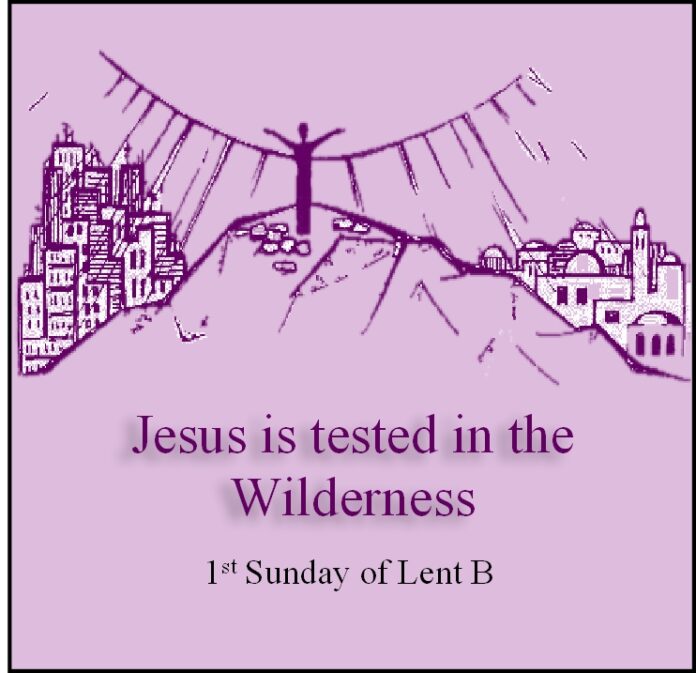21 February 2021
Genesis 9: 8 – 15
1 Peter 3:18 – 22
Mark 1:12 – 15
Jesus’ life was dominated by a single passion: to proclaim and establish on earth God’s reign of justice, peace and love. His mission was not about saving people’s souls by taking them out of the world and bringing them to heaven. It was about bringing God’s kingdom on earth and challenging people to embrace it. But how was he going to carry out this mission entrusted to him by the Father? He had no blueprint or plan of action to guide him. What he had was the Holy Spirit, the Spirit who came upon him at his baptism. This same Spirit – the divine energy that brought the universe into existence and ignited the fire of life – now drives Jesus out into the wilderness where he is tempted by Satan and clarifies for himself how he is going to establish God’s Reign in the world. A better word than tempted is tested.
Jesus’ forty days in the wilderness was a decisive and defining experience for him, determining the path his messianic mission would take. It led him to reject the way of violent revolution adopted by the Zealots, and the way of easy compromise adopted by the Jerusalem elite – the Sadducees and High Priests – and to choose instead the path of redemptive suffering. Jesus’ path would be to turn the other cheek, to walk the second mile and to take up the cross. He would defeat evil by letting evil do its worst to him, by suffering it in love and forgiving his enemies. Mark’s brief reference to the temptation of Jesus ends with the sentence: ‘He was with the wild beasts, and the angels looked after Him’ (Mk 1:13).
I can still vividly recall my own brief experience of the wilderness, while on a sabbatical programme in Jerusalem in the Spring of 2008. Along with my companions, I spent a short but memorable time in the Sinai Desert, including a night sleeping in the open. I had imagined the desert as a place of sand, heat and dust. But it wasn’t like that at all. Instead of sand there were rocks – huge mountainous boulders on every side – terrifying and yet strangely protective. Instead of heat, there was piercing cold. No matter how I tried to nestle down into my sleeping bag in my several layers of clothes and with my head covered, I could not get warm. Sleep eluded me and the night seemed to drag on and on interminably. And instead of dust, the air was crisp and clean with high visibility. I had never in my life seen so many stars in the sky, shining brilliantly, a sight of awesome beauty – ministering angels indeed! And then there was the silence, not just the absence of noise but the sense of ‘hush’ which made you want to speak in whispers so as not to disrupt the silence. It was an unforgettable experience. It made me feel small and insignificant and yet immensely privileged. It made me want to de-clutter my mind and heart and let go of things I thought I needed and focus on ‘something not sold for a penny / In the slums of Mind’ (Patrick Kavanagh, The Ascetic).
The message Jesus formulated in the wilderness and that we are called to take to heart in these days of Lent, is in the final words of today’s gospel: ‘Repent, and believe the Good News’ (Mk 1:15). This means to turn away from the clutter in our lives and to listen to the One who speaks to us in nature, in people and in the depths of our hearts. Lent is not a dreary, sad season to be patiently endured. It is a joyful season, as today’s Lenten preface reminds us: ‘Each year you give us this joyful season when we prepare to celebrate the paschal mystery with mind and heart renewed. You give us a spirit of loving reverence for you, Our Father, and of willing service of our neighbour. As we recall the great events that gave us new life in Christ, you bring the image of your Son to perfection within us’.
Lent, then, is a truly graced time; a time to embrace with enthusiasm ‘an offer we cannot refuse’; a time to experience afresh the breath of the Spirit and the embrace of God’s love; and to grow in our understanding of the riches hidden in Christ. It is not a time for ‘beating up’ on ourselves and our failures; it is rather a time to focus on God’s graciousness and fidelity to his promises as the first reading reminds us – a time to imitate the example of Christ and lay claim to his victory over Satan, as our second reading reminds us. Lent is the springtime of the Spirit, a time of hope and renewal, as Fr Flor McCarthy, SDB, reminds us in the following reflection:
Each year the trees give us a lesson in renewal.
First the bud, then the blossom, and finally the shoot.
Spring dresses the trees in a new robe, and makes them young again.
But this is possible only because in Autumn they let go of their old leaves,
and in between endure a period of nakedness.
Lent is the Springtime of the Spirit.
Lord, help us not to be afraid to let go of old habits,
and to face our spiritual poverty,
in order that you may renew us, and so at Easter
we will feel young again in our discipleship. Amen.
Michael McCabe SMA, February 2021
Click on the play button below to listen to an alternative homily from Fr Tom Casey SMA.
|
|

